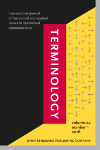
Terminology
Scope & Guideline
Bridging Disciplines through Rigorous Terminological Research
Introduction
Aims and Scopes
- Interdisciplinary Studies:
The journal emphasizes the intersection of terminology with various disciplines such as law, medicine, and digital marketing, showcasing how terminology impacts and shapes communication in diverse fields. - Methodological Innovations:
A focus on innovative methodologies for term extraction, analysis, and representation, including corpus-driven approaches and machine learning techniques, which contribute to advancements in the field of terminology. - Cultural and Ideological Perspectives:
Exploration of how terminology is influenced by and reflects cultural and ideological contexts, particularly in relation to contemporary issues such as climate change, disability, and legal discourse. - Practical Applications:
The journal highlights the practical applications of terminology studies, including its implications for translation, education, and public discourse, thus bridging the gap between theory and practice. - Technological Integration:
Investigating the impact of technology on terminology, including the use of digital corpora and the Semantic Web, to enhance accessibility and understanding of specialized language.
Trending and Emerging
- Impact of Global Crises:
There is a significant rise in research focusing on the terminological implications of global crises, such as the COVID-19 pandemic, emphasizing the importance of language in public health communication and crisis management. - Digital and Corpus Linguistics:
The increasing focus on digital methodologies, including corpus-driven analyses and the use of semantic web technologies, showcases a trend towards leveraging technology for term extraction and analysis. - Interdisciplinary Collaboration:
Papers demonstrating interdisciplinary collaboration across fields such as law, medicine, and digital marketing highlight a growing trend towards integrating terminology studies with practical applications in various sectors. - Cultural and Ideological Dimensions of Terminology:
Emerging themes include the exploration of cultural and ideological dimensions of terminology, reflecting a heightened awareness of how language shapes and is shaped by societal values. - User-Centered Terminology Practices:
An increase in research focusing on user-driven approaches to terminology, including participatory practices in terminology work, suggests a trend towards considering the needs and perspectives of end-users.
Declining or Waning
- General Linguistic Theory:
There appears to be a decrease in papers that broadly discuss general linguistic theories without direct application to terminology, indicating a potential shift towards more applied and specialized studies. - Historical Terminology Studies:
Research focusing on the historical evolution of specific terms or concepts has become less prominent, possibly due to a growing emphasis on contemporary and practical applications of terminology. - Traditional Translation Studies:
The journal has seen a decline in traditional translation studies that do not incorporate innovative methodologies or interdisciplinary approaches, reflecting a trend towards more integrated and technology-driven research. - Static Terminology Resources:
There is a waning interest in discussions surrounding static terminology databases and resources, with a noticeable shift towards dynamic, usage-based, and context-sensitive approaches. - Language Policy and Planning:
While still relevant, the frequency of papers addressing language policy and planning in a broad sense has decreased, suggesting a move towards more specific case studies or applications.
Similar Journals

Iberica
Advancing linguistic scholarship for a global audience.Iberica, an esteemed journal published by AELFE, serves as a vital platform for scholarly discourse in the fields of linguistics and language studies. With its inception as an Open Access publication in 1999, Iberica has democratized access to high-quality research, fostering an environment of collaboration and innovation among researchers and professionals alike. Based in Spain at UNIV JAUME I, the journal has witnessed a remarkable ascent in the 2023 category quartiles, achieving a Q1 ranking in Linguistics and Language. Furthermore, its impressive Scopus rankings place it in the top 25% within both the Arts and Humanities and Social Sciences disciplines. Covering a diverse range of topics from theoretical linguistics to applied language studies, Iberica offers a compelling opportunity for academics seeking to contribute to and engage with contemporary issues in the linguistic landscape. As it converges in its publishing years from 2008 to 2024, it continues to set the standard for excellence within its field, making it an essential resource for students, researchers, and language professionals.
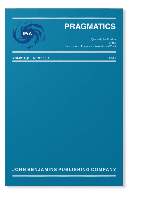
Pragmatics
Bridging theory and practice in pragmatic studies.Pragmatics is a premier international journal dedicated to the exploration and development of the field of pragmatics, published by John Benjamins Publishing Co. This esteemed journal, with an ISSN of 1018-2101 and E-ISSN 2406-4238, offers a vital platform for interdisciplinary research in linguistics, philosophy, and social sciences, making significant contributions to scholarly discourse since its convergence in 2005. Recognized for its high-impact research, Pragmatics boasts a prestigious Q1 ranking in both Linguistics and Language and Philosophy as of 2023, with impressive Scopus rankings that place it in the top percentiles of its categories. The journal aims to enhance understanding of communication in diverse contexts and encourages submissions that reflect innovative theoretical perspectives and empirical findings. Although not an open-access journal, it is essential for researchers, professionals, and students seeking to stay at the forefront of pragmatic studies and related disciplines. With its base in Belgium and an address in Amsterdam, Pragmatics continues to influence global conversations in the humanities and social sciences.

MODERNA SPRAK
Pioneering Discussions in Modern Language StudiesMODERNA SPRAK, published by LMS-Modern Language Teachers Association, is a vital journal in the field of linguistics and language studies that has been contributing to academic discourse since its inception in 2002. With an ISSN of 2000-3560, this Swedish journal provides a platform for researchers, educators, and language enthusiasts to explore contemporary issues and advancements in linguistics. Despite its Q4 category ranking in the 2023 category quartiles, its focus on diverse linguistic perspectives and innovative methodologies ensures its continued relevance and importance. As of 2023, it holds notable ranks within Scopus, placing it within the lower percentile of its categories—yet this offers a unique opportunity for emerging scholars to contribute to its growth and visibility. While MODERNA SPRAK is not an open access journal, it serves as a rich resource for academic networking and knowledge sharing in the evolving landscape of language education and research. The journal's commitment to fostering scholarship within an inclusive framework makes it an essential read for those engaged in the language sciences across various educational contexts.
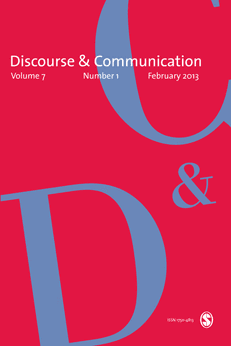
Discourse & Communication
Innovating perspectives in the art of discourse.Discourse & Communication, published by SAGE Publications Inc, stands at the forefront of interdisciplinary research, bridging the realms of Communication and Linguistics. Since its inception in 2007, this esteemed journal has consistently maintained a Q1 quartile ranking, underscoring its impact and relevance within the academic community, particularly with an impressive 89th percentile ranking in Social Sciences - Linguistics and Language and a notable 75th percentile in Social Sciences - Communication. The journal seeks to foster critical dialogue and innovative perspectives through empirical studies, theoretical contributions, and methodological advancements. Researchers, professionals, and students alike can benefit from its rich repository of knowledge and cutting-edge research, ensuring a robust platform for the exploration and dissemination of ideas in the field. With its dedicated focus on discourse analysis and communication studies, Discourse & Communication remains an essential resource for anyone engaged in the evolving landscape of social interaction and language use.

Cognitive Studies-Etudes Cognitives
Exploring the Intersections of Mind and CommunicationCognitive Studies-Etudes Cognitives, published by the Polish Academy of Sciences, Institute of Slavic Studies, is a prominent open-access journal based in Poland, dedicated to advancing research in the interdisciplinary fields of cognitive studies, communication, and linguistics. Since its inception, the journal has made a significant impact in the academic community, evidenced by its ranking in the Scopus database within the top 30% for Language and Linguistics. With an aim to bridge theoretical insights and practical applications, Cognitive Studies invites contributions that explore the complex interplay between language, cognition, and technology, making it a vital resource for researchers, professionals, and students alike. As the journal continues to grow, it remains committed to maintaining rigorous standards for publication while fostering an inclusive environment for innovative ideas and diverse perspectives. The journal is easily accessible and aims to facilitate knowledge dissemination, proudly offering open access since 2014.
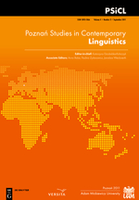
Poznan Studies in Contemporary Linguistics
Illuminating the dynamics of modern linguistics.Poznan Studies in Contemporary Linguistics, published by DE GRUYTER MOUTON, is a pivotal journal in the field of linguistics, with an ISSN of 0137-2459 and an E-ISSN of 1897-7499. Located in Germany, this esteemed journal has consistently contributed to the academic landscape since its inception. As of 2023, it holds a Q2 category rank in Linguistics and Language and boasts commendable Scopus rankings, featuring in the 69th percentile for Arts and Humanities and the 66th percentile for Social Sciences. The journal emerges as a vital platform for scholars to explore contemporary linguistic theories and practices, making it an essential resource for researchers, professionals, and students alike. With a converged publication period from 2007 to 2024, it aims to facilitate a deeper understanding of linguistic advancements and trends. While the journal currently does not offer open access, its rigorous peer-review process ensures the highest quality of published research, strengthening its role as a leading discourse in the dynamic field of linguistics.
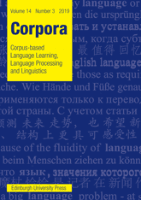
Corpora
Fostering Scholarly Dialogue in Corpora StudiesCorpora is a leading journal in the field of Linguistics and Language, published by Edinburgh University Press. Since its inception in 2006, Corpora has established itself as a pivotal platform for scholarly discourse, focusing on the analysis and interpretation of linguistic corpora across various contexts. The journal is recognized for its rigorous peer-review process and boasts a commendable impact within its category, achieving a Q2 ranking in the 2023 Linguistics and Language quartiles. Moreover, it ranks in the 79th percentile in Arts and Humanities Language and Linguistics and in the 77th percentile in Social Sciences Linguistics and Language, underlining its significance in the academic community. While currently not an open-access journal, Corpora is accessible to a broad audience, encouraging contributions from researchers, professionals, and students eager to advance the field of linguistics through innovative research and insightful discourse. For those invested in linguistic studies and corpora analysis, Corpora offers a vital resource and forum for the dissemination of high-quality research.
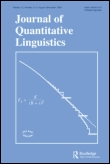
Journal of Quantitative Linguistics
Innovating Language Study with Empirical PrecisionThe Journal of Quantitative Linguistics, published by Routledge Journals, Taylor & Francis Ltd, stands as a pivotal resource in the field of linguistics, particularly in the rigorous application of quantitative methodologies to language research. Since its inception in 1994, this esteemed journal has contributed significantly to the understanding of linguistic phenomena through empirical data analysis, and it continues to maintain its esteemed Q1 ranking in the linguistics and language category as of 2023. Researchers and professionals will find a wealth of knowledge within its pages, as it publishes original articles, critical reviews, and methodological developments that push the boundaries of language study. While the journal is not open access, it remains widely accessible through institutional subscriptions, ensuring that a diverse readership can engage with the latest findings and theoretical advancements. As the journal looks forward to celebrating 30 years of impactful research by 2024, it remains dedicated to fostering discourse and innovation in the examination of language using quantitative approaches.

Lenguaje y Textos
Fostering Scholarly Excellence in Language StudiesLenguaje y Textos is a prominent academic journal published by the Universidad Politécnica de Valencia, Editorial UPV, dedicated to the exploration and analysis of language and texts within the fields of linguistics, literary studies, and communication. With its ISSN 1133-4770 and E-ISSN 2530-0075, this journal serves as a vital platform for researchers, professionals, and students, fostering scholarly discourse and advancing understanding in its area of expertise. Although currently not listed as open access, readers can access quality research articles that contribute to the progression of knowledge and methodology in language studies. With a commitment to excellence and relevance, Lenguaje y Textos is positioned to make significant contributions to the academic community, equipping its audience with the tools necessary for rigorous analysis and innovative research.

ENGLISH STUDIES
Fostering Scholarly Excellence in Literature and LanguageENGLISH STUDIES, published by Routledge Journals, Taylor & Francis Ltd, is a premier journal dedicated to exploring the rich tapestry of literature and linguistics. With a historical backdrop stretching from 1919 to 2024, the journal serves as a vital platform for scholars and practitioners engaged in advanced research and critical analysis. Its distinguished status is reflected in its impressive impact factor and category quartiles, ranking Q1 in Literature and Literary Theory and Q2 in Linguistics and Language for 2023, evidencing its influence and relevance in these fields. The journal's commitment to scholarly excellence is underscored by its high standings in Scopus Ranks, where it holds the #272 position in Literature and Literary Theory. Though it does not offer Open Access, the journal nevertheless ensures that its contributions shape contemporary understandings and discussions. As a vital resource for students, professionals, and researchers alike, ENGLISH STUDIES continues to push the boundaries of inquiry, dialogue, and innovation in the ever-evolving landscape of English literature and linguistics.